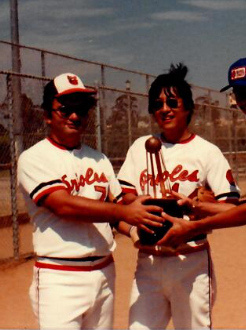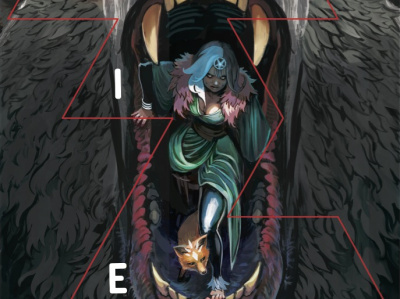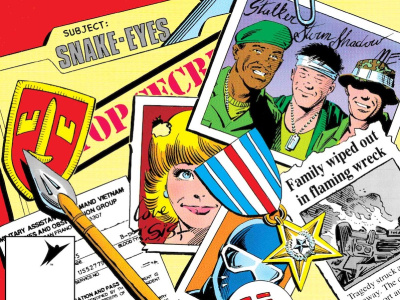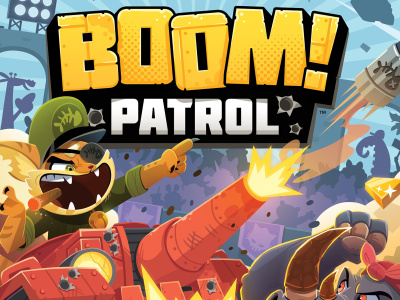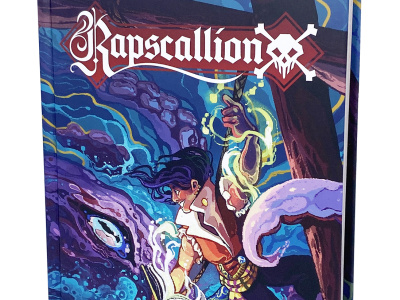He founded Diamond Comic Distributors in 1982 in part because the company that that had been servicing his comic shops was going out of business, and he wanted to be sure there was no interruption in supply.
Once he got going, though, he found that he was good at signing up new retailers as customers and managing the logistics of a model with tight profit margins.
Diamond grew to become the largest distributor in the country by 1988, and by 1997 it was the only major distributor selling comics to specialty stores. Diamond’s era of dominance of comics distribution lasted for more than 20 years.
But now we’re in a different era. Following the chaos of coronavirus lockdowns in 2020, and decisions by major publishers to move away from exclusively working with Diamond, the company is in a period of recalibration.
In an interview, Geppi spoke with confidence that he and Diamond are well-equipped to deal with the current competitive landscape. He reflected on the 41-year history of the company and what may be next.
"I have the same zest for life I've always had," he said. "I absolutely am in love with my business."
A Mailman Goes into the Comics Business
Geppi, 73, grew up in Baltimore’s Little Italy. He loved comics, with a special fondness for DC superheroes and Disney’s ducks. As an adult, he became a letter carrier and got serious about building his comics collection.
He began to sell some of the extras in his collection at comics shows, and found he was good at the process of acquiring old comics, finding customers who wanted them, and selling for a profit. This side business led to the opening of Geppi’s Comic World in Baltimore in 1974, a tiny store that sold back issue comics and didn’t have new comics.
The store grew and Geppi expanded to additional locations. He began to sell new comics, which he obtained from direct distributors. His distributor was Irjax Enterprises in Rockville, Maryland. Irjax got its name from two of the owners, Irwin Schuster and his son Jack Schuster. Hal Schuster, also Irwin’s son, also played a prominent role in the business.
Within the highly competitive world of comics distribution, Irjax had a reputation for bombast and litigiousness.
"Irwin was a nice old man, always nice to me," Geppi said. "Jackie was a young son that (followed) whatever his father said. He was semi‑pleasant, a little quirky. Hal was a real wild card."
When people would say they had a problem with Irjax, they often meant they had a problem with Hal.
"He was a boisterous personality," Geppi said.
In 1982, Irjax was struggling financially. It had moved to Florida and went by the name New Media/Irjax. Geppi was the company’s biggest customer.
He knew from conversations with others in the industry that he needed to find a new distributor because New Media/Irjax was about to be cut off from new orders from publishers.
But before he did that, the Schusters asked him if he wanted to acquire some of their comics distribution assets, which included small warehouses in Massachusetts and Florida. He said yes, because the price was right and because acquiring the assets would be easier than switching to another distributor.
Diamond Comic Distributors opened its doors on Feb. 1, 1982. The name came from the Diamond shape that Marvel Comics had on the covers of comics it sold in the Direct Market.
"I literally put the order form together. I literally compiled the orders. I literally filled the orders,” he said.
Rising to the Top
Geppi had become a distributor at a time of chaos and growth for comic shops. Some old distributors were fading from the market and there was an opening for an ambitious new company to grab market share.
The company made some good hires in its early years that set the stage for success.
On the financial side, Geppi hired Chuck Parker to serve as controller and now Parker is the company’s president. Another was Larry Swanson, who is now chief financial officer.
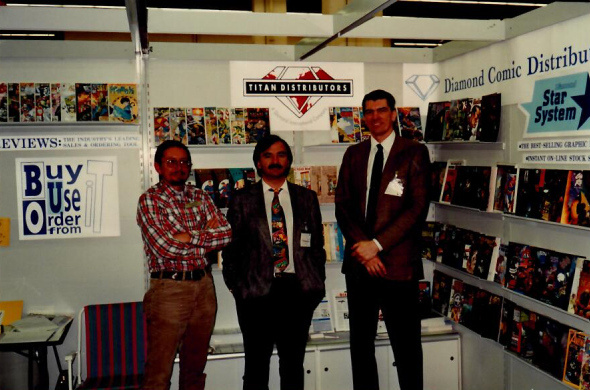
Bill Schanes (Diamond Comic Distributors), center, with Mile High Comics' Chuck Rozanski (left) and Marvel Comics' Jim Shooter (right).
"Bill was very, very important, very instrumental," Geppi said.
In those early years, Diamond gained a reputation for being uncomfortable selling comics with explicit sexual content and extreme violence. One example was Miracleman #9 from Eclipse Comics in 1986, which had a childbirth scene.
"I was a father with kids," Geppi said. "Here's a girl with her legs spread wide open, giving birth. I'm thinking, ‘I don't want my kids to find out about the birds and the bees this way.’ I caught a lot of heat for that."
Diamond refused to distribute some comics it regarded as inappropriate. Later on, the company created a list of "cautionary comics" as Geppi called them, which were available for order but that the company wanted to flag so that shop owners knew not to sell them to children.
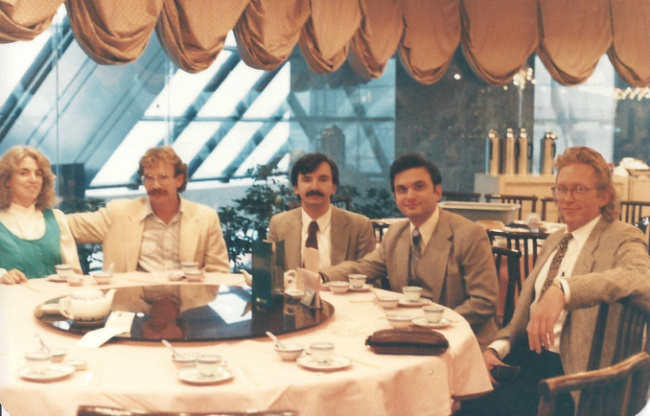
Dinner on the 1987 Jademan trip to Hong Kong. L-R, Ann and Bud Plant of Bud Plant Inc., Bill Schanes and Steve Geppi of Diamond Comic Distributors, Milton Griepp of Capital City Distribution.
Unlike Capital City, which covered much of the country, nearly all of Diamond’s customers were in the eastern United States. Meanwhile, Bud Plant Inc. of California was a leader on the West Coast and the third largest distributor.
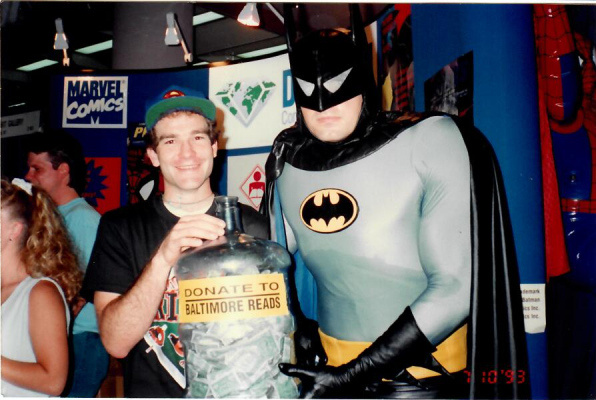
Longtime Diamond VP Roger Fletcher was one of the Bud Plant employees hired by Diamond. Here, a young Fletcher with Batman.
"I always loved Bud because he was such a down-to-earth guy," Geppi said.
Diamond had an advantage over other distributors in dealing with Plant because of the prominent role of Schanes, someone who also came from California and had business with Plant before.
When Plant decided he wanted to sell his distribution company, he felt like he could trust Geppi and Schanes to give a fair deal and also to not disclose that discussions about a sale were happening.
Diamond’s purchase of Bud Plant Inc. in 1988 made Diamond the largest distributor in the country. An industry of small distributors had turned into near-duopoly of Diamond and Capital City.
"Capital City was the more hip, innovative distributor, to be honest, at that time," Plant said in an interview this year. "Geppi really needed what he got from my business, which was catalog production, and selling non‑comics‑related stuff, the book distribution. He got my employees and stuff, so he got a lot out of it. It was a good blending of the two businesses."
Geppi gained a reputation as a good partner for making a deal, someone who would live up to his word. This was a factor when another East Coast distributor, Comics Unlimited, was looking to sell in the early 1990s.
{IMAGE_7}Diamond made an agreement to buy Comics Unlimited in 1994, but during the time before the deal closed, the comics industry went into freefall. Ron Forman, who co-owned Comics Unlimited with Walter Wang, said Geppi would have been within his rights if he tried to renegotiate the sale price or scrap the deal to reflect the shift in the industry. But Geppi never did.
"Steve Geppi was as gentlemanly and reasonable as anyone we ever dealt with," Forman said, in a 2016 interview. He died in 2022. "We got our 120 checks, each on time. We always remained friends."
The Heroes World Debacle
Diamond and Capital City both prospered during boom in comics sales in the late-1980s and early 1990s. And they both suffered when the boom began to turn to bust in 1993.
The publishers also struggled to deal with a drop in sales. Marvel, which was publicly traded, faced pressure from its management and shareholders to improve its numbers. The company’s strategy turned out to be one of the great boondoggles in the history of comics retail.
Marvel bought Heroes World, a small regional distributor in New Jersey, late in 1994. Then Marvel said Heroes World would be the exclusive distributor of Marvel’s products.
This was devastating for Diamond and Capital City, both of which depended on Marvel for about 40 percent of comic sales. It also hurt retailers by requiring them to get accounts with Heroes World to get Marvel publications while still ordering other publishers through Diamond, Capital City or some other distributor. Some retailers saw decreases in their volume discounts.
DC Comics faced the possibility that one or more distributors might go out of business, which would hinder the company’s ability to get its comics into stores. DC decided it needed to have its own exclusive distributor, to help shore up one of the companies and also to establish a partnership that would give it greater access to market data.
With a choice that included Diamond or Capital City, DC chose Diamond.
"Apples to apples, we felt that Diamond's chance of succeeding was a little bit better," said Paul Levitz in an interview this year with Capital City co-founder Milton Griepp, who also is ICv2’s publisher (see "ICv2 Interview: Paul Levitz").
Having lost Marvel and DC, Capital City stood at the brink of being forced to close. Capital approached Diamond with an interest in selling, Diamond made an offer, and Capital City’s owners accepted.
Soon after, Marvel decided that its experiment with Heroes World wasn’t working. Marvel wanted to go back to working with an outside distributor, and at that point Diamond was the only viable option.
As of 1997, stood alone atop its industry, but the market had shrunk so much that the company’s annual revenue was way down from the years when it was one of several leading distributors.
"The industry imploded," Geppi said.
The Monopoly Era
The Diamond monopoly era (although Geppi doesn’t like it when people call it that) lasted from 1997 to 2020. It was a period when the comics industry grew in many ways with many audiences.
"To quote Stan Lee, ‘With great power comes great responsibility,’" Geppi said. "It suddenly became even more of a focus (that) the weight of the industry was on me personally, because any decision I make would be felt by a lot of people."
Movies and television shows based on comics became mainstream hits. Comics in book form became a category larger than comics in magazine form, helped by a growing presence of comics in bookstores, school book fairs and libraries. A new generation of bestsellers went straight to the book format, including a surge in books for young readers.
Diamond grew and adapted amid the changing landscape. It bought Alliance Game Distributors in 2000, which was the country’s largest distributor of tabletop games, and it created Diamond Book Distributors in 2002, a division that specialized in sales to bookstores. The various companies are subsidiaries of Geppi Family Enterprises.
Comics retailers had no alternative to Diamond for obtaining material from the major comics publishers. This led to grumbling, especially for some retailers who argued that the lack of competition gave Diamond little incentive to be responsive to concerns.
But many retailers would be looking back fondly at the Diamond monopoly era once they saw what came next.
Joe Field, who runs Flying Colors & Other Cool Stuff in Concord, California, has long been a leader among comic shop owners. He has been critical of some of Diamond’s actions over the decades, and also worked with the company on initiatives like Free Comic Book Day, which was Field’s idea.
He said Geppi has been a good steward of comics retail.
"I’ve always appreciated his positive outlook, his willingness to take the competition head on and his ability to build a team that gets things done," Field said.
Covid and What Came After
In 2019, Geppi said in a note to customers that he was stepping back a bit. He would remain chairman and CEO of Geppi Family Enterprises, but would no longer be president. He regarded this as semi-retirement, but joked that it meant he was "down to 60 hours per week."
Then the coronavirus pandemic hit in 2020. Comic shops in much of the country were forced to temporarily close or shift to curbside pickup.
Diamond needed to decide how to handle distribution at a time when retailers had different situations based on where they were located. If Diamond decided to keep shipping products, some of its retailers would have been unable to pay for what they had ordered. If comics had continued to come out, customers whose local stores were forced to close could have shifted to buying via mail order or some other method, contributing to shift away from local physical stores.
Diamond responded by deciding that it would not ship anything and go into an indefinite hiatus, which ended up lasting for about two months.
Diamond’s ability to stop shipments led to consternation from the major comics publishers. Some of the senior leaders at the publishers were relatively new to the comics business and questioned whether the relationship with Diamond still made sense.
DC Comics was the first to break away from Diamond. DC said in June 2020 that it was switching to having its comics and graphic novels distributed to comic stores by two newly created businesses, UCS Distributors, tied to the retailer Midtown Comics, and Lunar Distribution, tied to the retailer Discount Comic Book Service (see "DC Cutting Off Diamond").
On July 1, Geppi announced that he was returning to the president role at Geppi family enterprises, in addition to being chairman and CEO. His semi-retirement was done.
But the erosion of Diamond’s market dominance would continue. In March 2021, Marvel Comics said it was switching to having its books and comics distributed by Penguin Random House. Other publishers have since made their own deals, including Dark Horse Comics, IDW Publishing and Image Comics, ending exclusive partnerships with Diamond.
The result is that Diamond lost exclusive contracts with nearly all major publishers, although it maintained status as a wholesaler for some of them. For example, comic shops can still obtain Marvel Comics from Diamond. But to get comics from DC in the U.S., shops have no choice but to buy from Lunar, which is now DC’s sole distributor to the comic shop market.
"Diamond's been gut‑punched," Geppi said. "Everybody was gut‑punched with Covid."
An exception is Diamond UK, a subsidiary of Diamond, which continues to sell DC and other major publishers.
The changes have forced Geppi and Diamond to make cuts and restructure their businesses. He said the company is now 60 percent of its previous size, and the staffing has been adjusted to account for this decrease.
But Geppi said the company is alive and well, in part because some of its subsidiaries continue to thrive. Alliance Game Distributors is one example of a business that has maintained a leading role in its market.
"Alliance is really a juggernaut right now and does extremely well," he said.
He has lived through drastic ups and downs in his business before, the most notable being the mid-1990s crash in the comics market, and knows the value of being nimble in times of rapid change.
One difference between then and now is he is older. He is 73 and has made plans for his children and other family to be in position to assume ownership of the business.
Asked about Geppi’s legacy, Field said this: "It may be too soon to take a long view of Steve's legacy because it seems there's a few more chapters left to be written," he said. "Looking back, it's clear he has been an industry mover, innovator and a key person in the history and the health of the Direct Market. We might have some discussion about whether the Direct Market is a thing of the past, but Steve's place in shaping the comics specialty market is undeniable."
Asked about what’s ahead for him, Geppi said he has no retirement date in mind.
"I can't take a day of my life for granted," he said. "Every morning when I wake up I thank God that I'm on the right side of the grass. But that said I don't have any real plans to go away. I can't imagine me retiring."
This article draws, in part, on a recent ICv2 interview with Geppi.
In a lightly edited transcript form:
ICv2 Interview Transcript: Steve Geppi, Part 1
ICv2 Interview Transcript: Steve Geppi, Part 2
ICv2 Interview Transcript: Steve Geppi, Part 3
And in video form:
ICv2 Video Interview: Steve Geppi, Part 1
ICv2 Video Interview: Steve Geppi, Part 2
ICv2 Video Interview: Steve Geppi, Part 3
This interview and article are part of ICv2’s Comics Direct Market 50th Anniversary celebration; for more, see 2 Interview Transcript: Steve Geppi, Part 3"Comics Direct Market 50th Anniversary."





